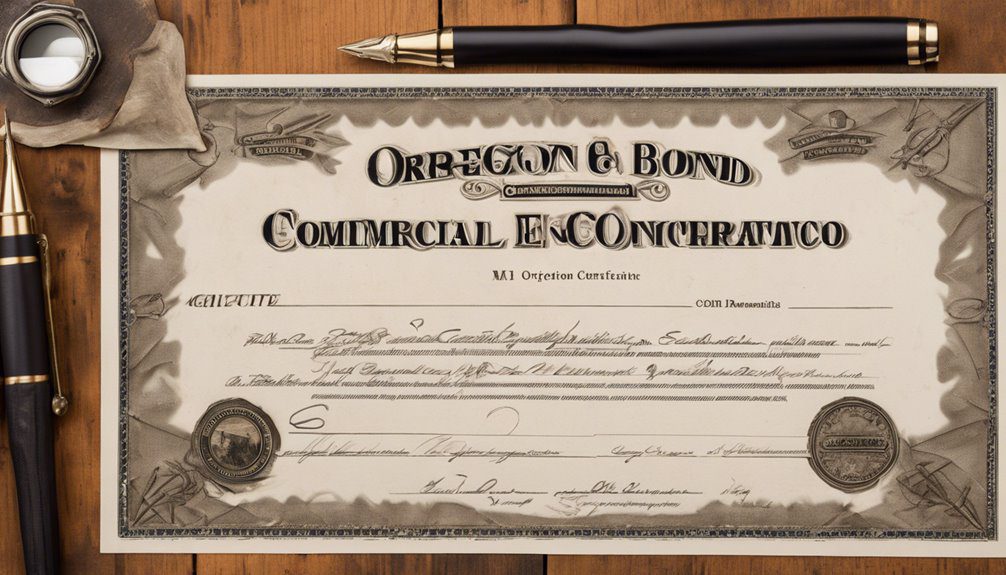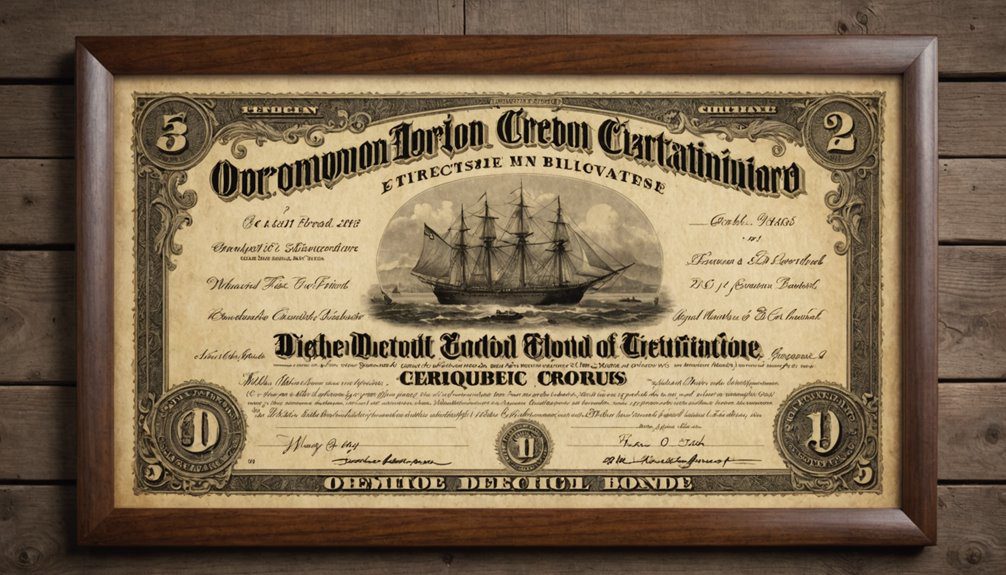If you're a contractor in Oregon, understanding the Commercial Contractor License Bond is essential for your business. This bond not only protects your clients but also ensures you comply with state regulations. However, navigating the requirements and processes can seem daunting. You might be wondering how to qualify or what the costs could be. Knowing the answers could significantly impact your operations and reputation in the industry. What steps should you take to secure this bond, and what could happen if you overlook it?
Understanding Contractor License Bonds

A contractor license bond is a crucial component for anyone looking to operate legally in Oregon's construction industry. This bond acts as a safeguard, ensuring that you comply with state laws and regulations while protecting your clients and the public.
When you obtain a contractor license bond, you're essentially promising to perform your work ethically and responsibly. The bond serves as a financial guarantee that if you fail to fulfill your contractual obligations or violate state laws, the bond provider will cover any resulting claims up to the bond amount.
For you, this means demonstrating reliability and professionalism to your clients, which can enhance your reputation in the competitive construction market. Additionally, understanding the Illinois Department of Financial and Professional Regulation can provide insight into how surety bonds are regulated and the importance of compliance.
Obtaining a contractor license bond involves a straightforward application process. You'll need to provide information about your business and financial standing, and the surety company will evaluate your risk before issuing the bond.
Keep in mind that your credit score and business history can influence the cost of your bond. By understanding contractor license bonds, you can take the necessary steps to secure your bond and ensure your business operates smoothly and legally in Oregon.
Importance of the Bond
Understanding the importance of a contractor license bond can significantly impact your success in Oregon's construction industry. This bond acts as a safety net for your clients, ensuring that they're protected against potential financial losses due to your failure to comply with state regulations or contractual obligations.
When you hold a valid bond, you demonstrate your commitment to ethical business practices and professionalism, which can enhance your reputation and attract more clients.
Moreover, many project owners and general contractors require proof of a contractor license bond before awarding contracts. If you don't have one, you might miss out on lucrative opportunities.
The bond also serves as a form of insurance, covering claims made against you, thus protecting your assets and financial stability.
In addition, maintaining your bond can help you build strong relationships with suppliers and subcontractors. They're more likely to trust you and engage in business when they see you're bonded.
Ultimately, having a contractor license bond isn't just a legal requirement; it's a crucial element in establishing credibility and fostering trust in your business. Furthermore, the bond protects against financial loss due to non-compliance and ensures that all parties involved are safeguarded.
Eligibility Requirements

To qualify for an Oregon commercial contractor license bond, you need to meet specific eligibility requirements set by the state.
First, you must hold a valid Oregon contractor's license. This means you've successfully completed the licensing process, which includes demonstrating your skills and knowledge in the construction industry.
Next, you need to be in good standing with the Oregon Construction Contractors Board (CCB). This involves having no outstanding violations or complaints against you. If you've faced any disciplinary action, it may affect your eligibility for the bond.
Additionally, you'll need to provide financial information. Insurers often require you to show proof of a stable financial background, which can include credit history and business financial statements. This helps them assess the level of risk they'd be taking on by issuing the bond.
Lastly, it's essential to understand that the bond amount may vary based on the type of work you plan to undertake. Ohio mandates specific bonds for various professions, including contractors, which can guide you in determining the appropriate bond amount.
Make sure you know the required bond amount for your specific contracting activities to ensure you meet all conditions. Being aware of these eligibility requirements will streamline the process and get you closer to securing your bond.
Steps to Obtain the Bond
How do you go about obtaining an Oregon commercial contractor license bond? First, you'll need to gather the necessary documentation. This typically includes proof of your contractor's license and any relevant business information.
Once you have your documents in order, you can start shopping around for a surety company. It's crucial to choose a reputable provider, so do your research and read reviews.
Next, you'll need to fill out an application with the surety company. The application usually requires details about your business, work experience, and financial history.
The surety company will assess your application, which may involve a credit check and an evaluation of your financial stability.
Once approved, you'll receive a bond quote. Review the terms carefully, as they can vary between providers.
If you're satisfied, you'll sign the agreement and pay any associated fees. After that, the surety company will issue the bond, and you'll receive a copy for your records. Additionally, ensure you understand the types of surety bonds available, as this can affect your bonding requirements.
Costs Associated With the Bond

The costs associated with an Oregon commercial contractor license bond can vary significantly based on several factors, including your credit score, the bond amount required, and the surety company's rates.
Generally, you'll pay a premium, which is a percentage of the bond amount. For example, if you need a $100,000 bond and the premium rate is 1%, you'll pay $1,000.
Your credit score plays a crucial role in determining that premium rate. If you have excellent credit, you might secure a lower rate, while a lower credit score could lead to higher costs.
Surety companies assess risk differently, so it's wise to shop around for the best rates. Additionally, the bond amount itself can affect your overall costs. Some projects might require higher bonds, which means your premium will be proportionately higher.
Be prepared to provide financial documentation, as this can also influence your rates. Ultimately, understanding these factors will help you budget effectively for obtaining your Oregon commercial contractor license bond.
Additionally, contract bonds are essential for ensuring project completion and payment to subcontractors, which can impact your overall bonding costs.
Don't hesitate to reach out to multiple surety companies to get quotes and compare your options, ensuring you find the best deal for your situation.
Bond Renewal Process
Renewing your Oregon commercial contractor license bond is a straightforward process that helps ensure your business remains compliant. Typically, you'll want to start the renewal process a few weeks before your bond expires. This gives you ample time to gather any necessary documents and avoid any lapses in coverage.
First, check with your bond provider to understand the specific requirements for renewal. You may need to fill out a renewal application and provide updated information about your business. If your financial situation has changed, be prepared to submit additional documentation, such as financial statements.
Once you've completed the required paperwork, submit it to your bond provider along with any renewal fees. The cost of renewal may vary based on your bond amount and your financial history.
After processing your renewal, your provider will issue a new bond, which you'll need to file with the appropriate state agency.
It's crucial to keep track of your bond's expiration date and initiate the renewal in a timely manner. Staying proactive about the renewal process helps you avoid potential disruptions to your business operations.
Consequences of Bond Violations

Violating the terms of your Oregon commercial contractor license bond can lead to serious consequences that impact your business. If you fail to meet the bond requirements, you risk losing your contractor's license, which can prevent you from legally operating in the state.
This loss not only halts your current projects but can also tarnish your reputation in the industry.
Moreover, bond violations may trigger claims against your bond. If a claim is made, the bonding company may pay out the claim amount, but you'll be responsible for reimbursing them.
This financial burden can strain your cash flow and affect your ability to take on new projects.
In addition, repeated violations can lead to higher bonding costs or even the inability to secure a bond in the future. This can severely limit your business opportunities, as many clients require proof of a valid bond before hiring contractors.
Ultimately, staying compliant with your bond terms is crucial for maintaining your business's credibility and financial health. Insurance broker bonds serve as a financial guarantee for compliance with laws and regulations.
It's vital to understand your obligations and take proactive steps to avoid any violations to ensure your contractor license remains intact.
Frequently Asked Questions
When it comes to Oregon commercial contractor license bonds, you likely have questions about the requirements, processes, and implications of your bond.
One common question is, "What's the purpose of the bond?" Essentially, it protects clients from potential financial loss due to your failure to comply with laws and regulations.
You might also wonder, "How much does the bond cost?" The bond amount varies based on your license type and the bond's coverage, but you can expect to pay a premium, typically ranging from 1% to 15% of the total bond amount.
Another frequent query is about the duration of the bond. Generally, your bond remains in effect as long as your contractor license is active. If you decide to let your license expire, you'll need to cancel the bond.
Finally, you may ask, "What happens if I need to file a claim?" If a claim is made against your bond, it's crucial to respond promptly and work with your surety company to resolve the issue. Additionally, understanding the different types of surety bonds can help you choose the right bond for your needs.
These are just a few questions you might have, but understanding these fundamentals can help you navigate the bonding process more effectively.
Resources for Contractors

As a contractor in Oregon, you have access to a variety of valuable resources that can help you stay informed and compliant in your industry. The Oregon Construction Contractors Board (CCB) is your primary source for licensing information, regulations, and updates. Their website offers guidance on how to apply for your license and maintain compliance with state laws.
You should also consider joining local contractor associations. Organizations like the Oregon Home Builders Association provide networking opportunities, educational resources, and industry insights that can help you grow your business. These associations often offer workshops and seminars on best practices and emerging trends.
Additionally, online resources such as the Oregon Secretary of State's website can help you stay updated on business regulations and requirements.
Don't forget to utilize social media and forums where fellow contractors share experiences and tips.
Lastly, investing in industry-related publications can keep you informed about new technologies, materials, and methods. Furthermore, understanding the importance of surety bonds can provide added security for your projects and ensure compliance with local regulations.
Conclusion
In summary, the Oregon Commercial Contractor License Bond is essential for your business's credibility and compliance. By understanding its importance and following the necessary steps to obtain and renew it, you can protect yourself and your clients from potential financial pitfalls. Staying informed about eligibility requirements and consequences for violations will help you maintain a solid professional reputation. Remember, investing in this bond is a crucial step toward building trust and ensuring your success in the contracting industry.

